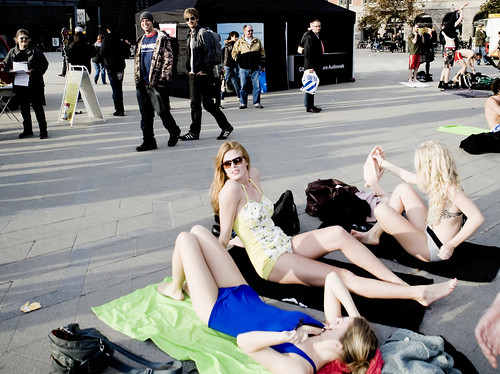 In a little over two weeks, the world’s leaders will be meeting in Copenhagen to discuss and hopefully agree on decisions to reduce carbon emissions. The United Nations Climate Change Conference (COP15) is perhaps the last chance to achieve consensus on this contentious issue.
In a little over two weeks, the world’s leaders will be meeting in Copenhagen to discuss and hopefully agree on decisions to reduce carbon emissions. The United Nations Climate Change Conference (COP15) is perhaps the last chance to achieve consensus on this contentious issue.
Why should you care?
According to the Intergovernmental Panel on Climate Change, the carbon emissions for all countries must (not will) peak no later than 2015. These emissions then must reduce by 80% or more by 2050 if we are to avoid the worst effects of climate change.
Sounds bad, right? Sounds difficult, yes?
The thing is, we are being asked to make decisions – or rather – we are asking/pushing our leaders to make decisions on our behalf. But these decisions won’t just change our lives – they will have far reaching impacts on our children and grandchildren. How important are your children to you? What kind of world do you want to see them live in?
 I don’t know about you, but one of the most joyous memories I have from childhood is running through a sprinkler with my brother on the hot days of summer. These simple, common activities bond us as families and communities – they signify where you grew up – where you belong. And I have a feeling that losing these things will profoundly affect the way that we see ourselves as a society.
I don’t know about you, but one of the most joyous memories I have from childhood is running through a sprinkler with my brother on the hot days of summer. These simple, common activities bond us as families and communities – they signify where you grew up – where you belong. And I have a feeling that losing these things will profoundly affect the way that we see ourselves as a society.
Already, the world I live in looks vastly different to the one I grew up in – and the opportunities and experiences I had may simply not be available to future generations.
Is this a big deal for business?
One of the biggest challenges for business is not necessarily the costs involved with climate change – it is the uncertainty. As James Farrar points out, “Most business leaders already understand that CO2 emissions are a significant risk to the sustainability of their business but they lack the regulatory certainty and incentives necessary to begin to deal with the problem.” Once these frameworks and incentives are in place, business leaders will be able to focus on the programs of change, innovation and investment that will put them at the forefront of their industries.
What? You're a climate change skeptic?
I am not asking you to change your beliefs. I know all the facts in the world won’t change your position. I am just asking you what are you prepared to risk? What is the risk of inaction?
What can you do?
You can start by registering your petition with the Hopenhagen website – calling on global leaders to “seal the deal”. There are Facebook applications, blog posts, T-shirts and so on – all available from the Hopenhagen website.
Of course, there is more. There is always more that we can do. The important thing is to start.
Great post Gavin. I’ve been despairing a great deal in recent weeks as the world’s leaders seem to be prepping us for disappointment at Copenhagen: ensuring us that the likelihood of a deal at COP15 is unlikely, etc.
I’m so sick of our elected officials coming together to talk about talking, and never actually doing. While they stand there, paralysed with inaction, they seem to be deaf the pleas of the people who elected them. What I can’t figure out is whether their inaction is as a result of feeling that the steps they need to take to ensure our futures are insurmountable? Or whether sadly, we don’t actually live in a world where our leaders have the courage to step out onto the ledge and lead.
All this doom and gloom aside though, I’m happy to report that I have my Hopenhagen passport, and I have my fingers crossed for great news on the 18th December.
As an aside, you may be interested to read one of the most stirring pieces that I feel has ever been delivered on the subject of the need for action on Climate Change. It’s the transcript of a speech by WWF CEO Greg Bourne, delivered at the 8th Annual Hawke lecture, back in 2005. Sadly, 4 years later, the song remains the same, and still we wait for action… http://bit.ly/6odKrC